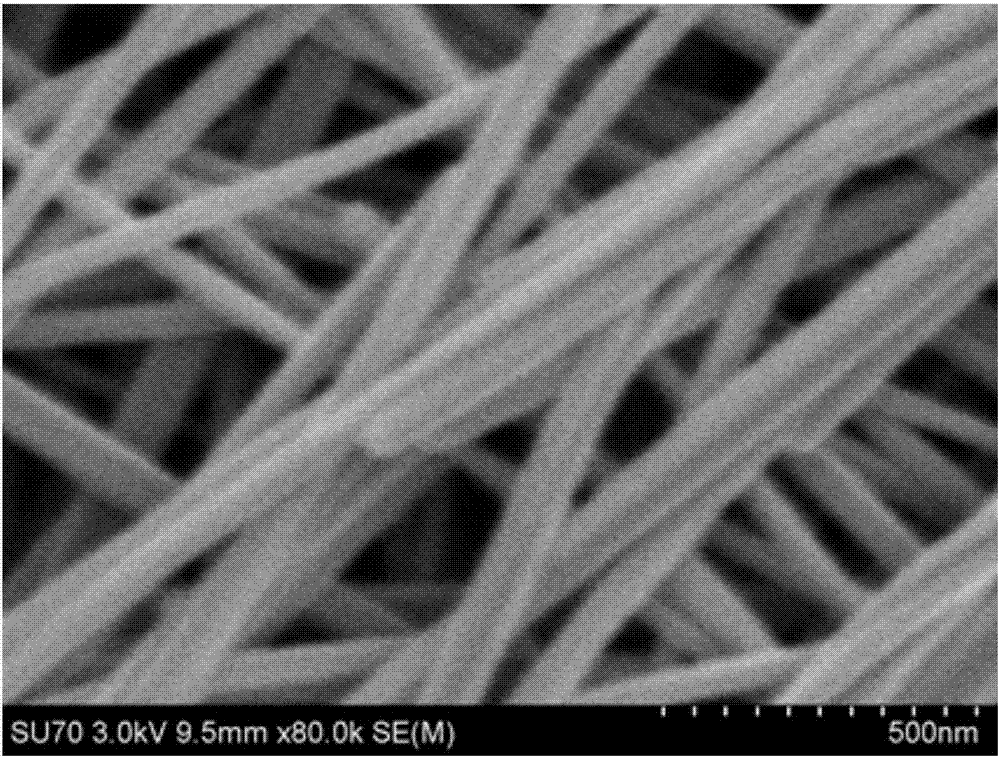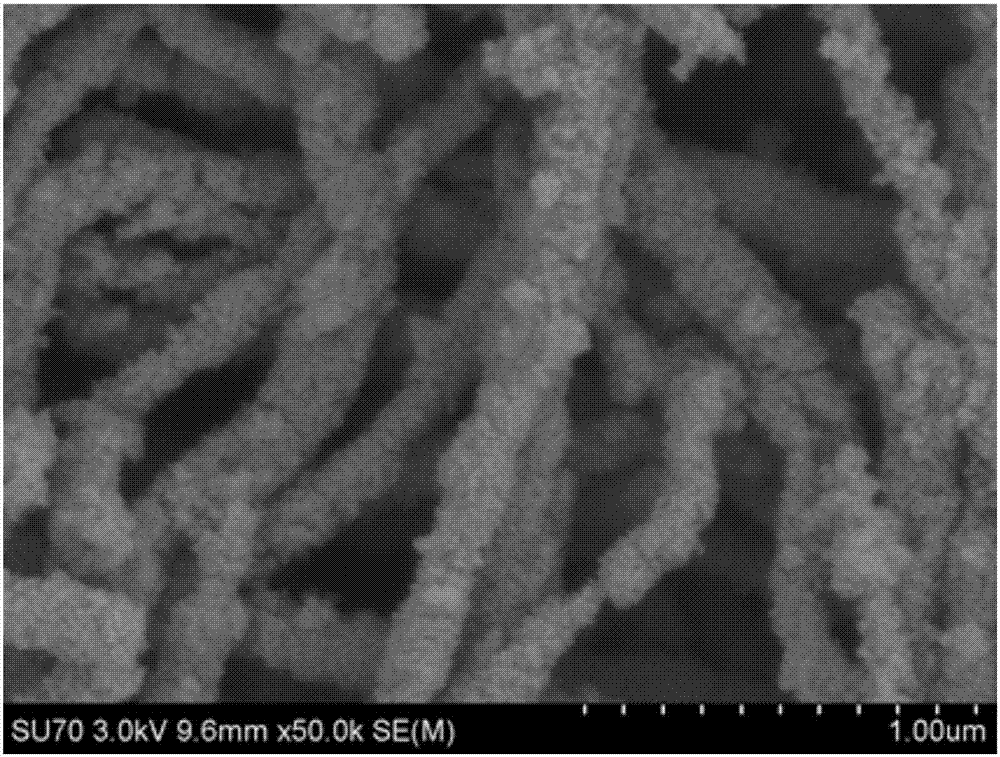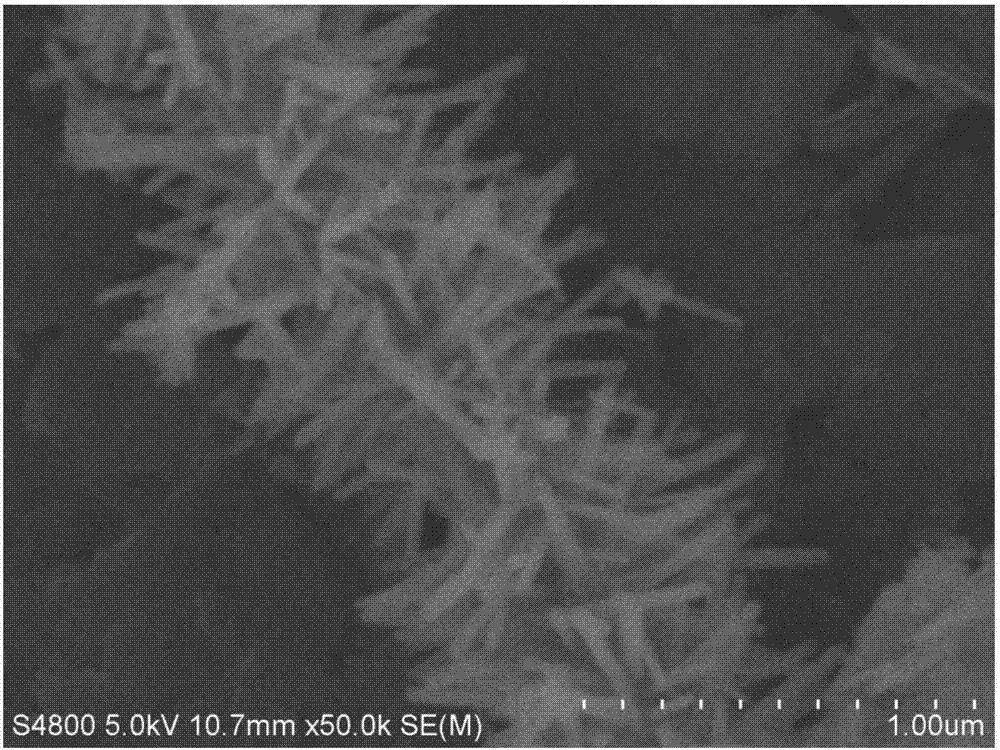Core-shell structure Ag/TiO2/ZnO nanowire and preparation method for same
A core-shell structure and nanowire technology is applied in the field of core-shell structure Ag/TiO2/ZnO nanowires and their preparation, which can solve the problem of no Ag/TiO, and achieve the effect of improving stability and carrier separation efficiency.
- Summary
- Abstract
- Description
- Claims
- Application Information
AI Technical Summary
Problems solved by technology
Method used
Image
Examples
Embodiment 1
[0027] 1) Preparation of Ag nanowires: Add 2.93g polyvinylpyrrolidone to 95mL glycerol, stir at 90°C for 1.5h, then stop heating, let it cool down to 50°C, add 0.79g silver nitrate; prepare 29.5mg chloride A mixed solution of sodium, 0.25mL deionized water, and 5mL glycerol, then put the mixed solution into the container, then raise the temperature to 210°C, react for a total of 40min, stop heating, take out, wash and separate to obtain of silver nanowires.
[0028] 2) Disperse 100mg silver nanowires in 40mL ethanol solution, then add 8mg polyvinylpyrrolidone, stir magnetically for 10min, then add 0.4mL tetrabutyl titanate and 0.6mL deionized water dropwise, continue stirring for 30min, Washed with water, dispersed in 10mL of deionized water, and hydrothermally reacted at 160°C for 12h to obtain core-shell structure Ag / TiO 2 Nanowires.
[0029] 3) Add 68.5mg of zinc acetate to 32mL of methanol, stir at 60°C for 40min, then add 16.5mL of methanol solution containing 27.5mg of...
Embodiment 2
[0033] 1) Same as step (1) of Example 1.
[0034] 2) Disperse 100mg silver nanowires in 40mL ethanol solution, then add 8mg polyvinylpyrrolidone, stir magnetically for 10min, then add 0.4mL tetrabutyl titanate and 0.6mL deionized water dropwise, continue stirring for 30min, Washed with water, dispersed in 10mL of deionized water, and hydrothermally reacted at 120°C for 12h to obtain core-shell structure Ag / TiO 2 Nanowires.
[0035] 3) Same as step (3) of Example 1.
[0036]4) Transfer the product obtained in step 3) to 30 mL of an aqueous solution containing 0.178 g of zinc nitrate and 0.084 g of hexamethylenetetramine, and stir at 80 °C for 1 h to obtain a core-shell structure Ag / TiO 2 / ZnO nanowires.
[0037] Figure 6 The field emission scanning electron microscope pictures show the successful acquisition of Ag / TiO 2 / ZnO one-dimensional core-shell branched nanowire structure.
Embodiment 3
[0039] 1) Same as step (1) of Example 1.
[0040] 2) Disperse 100mg of silver nanowires in 40mL of ethanol solution, then add 8mg of polyvinylpyrrolidone and magnetically stir for 10min, then add 0.4mL of tetrabutyl titanate and 0.6mL of deionized water dropwise, continue to stir for 30min, and use deionized water Wash, disperse into 10mL of deionized water, and conduct a hydrothermal reaction at 200°C for 8h to obtain a core-shell Ag / TiO 2 Nanowires.
[0041] 3) Same as step (3) of Example 1.
[0042] 4) Transfer the product obtained in step 3) to 30 mL of an aqueous solution containing 0.178 g of zinc nitrate and 0.084 g of hexamethylenetetramine, and stir at 90 ° C for 2 h to obtain a core-shell structure Ag / TiO 2 / ZnO nanowires.
[0043] Figure 7 The field emission scanning electron microscope pictures show the successful acquisition of Ag / TiO 2 / ZnO one-dimensional core-shell branched nanowire structure.
PUM
| Property | Measurement | Unit |
|---|---|---|
| Diameter | aaaaa | aaaaa |
Abstract
Description
Claims
Application Information
 Login to View More
Login to View More - R&D
- Intellectual Property
- Life Sciences
- Materials
- Tech Scout
- Unparalleled Data Quality
- Higher Quality Content
- 60% Fewer Hallucinations
Browse by: Latest US Patents, China's latest patents, Technical Efficacy Thesaurus, Application Domain, Technology Topic, Popular Technical Reports.
© 2025 PatSnap. All rights reserved.Legal|Privacy policy|Modern Slavery Act Transparency Statement|Sitemap|About US| Contact US: help@patsnap.com



